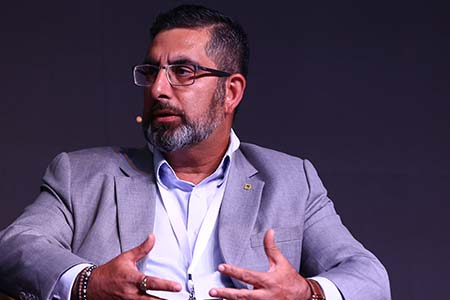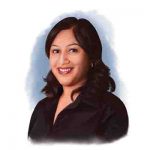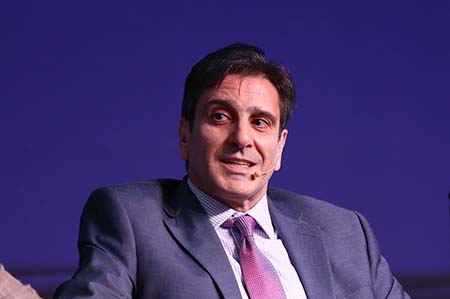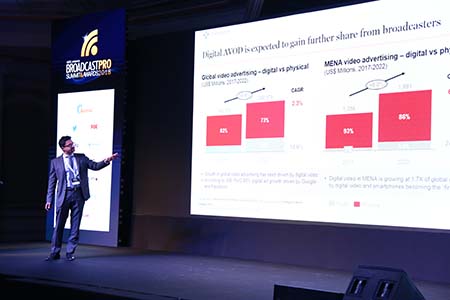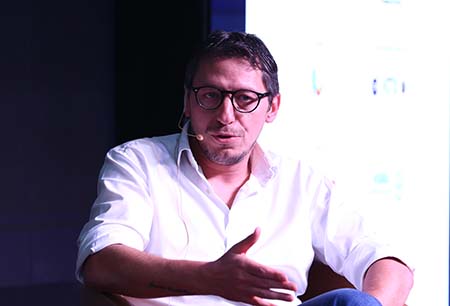From lack of regulations on foreign content to the decline in advertising revenues, CEOs at the 2018 ASBU BroadcastPro Summit offered candid insights on steering their organisations through turbulent times. The final panel at the 2018 ASBU BroadcastPro Summit offered the audience a privileged view into how top executives are coping with some of the […]

From lack of regulations on foreign content to the decline in advertising revenues, CEOs at the 2018 ASBU BroadcastPro Summit offered candid insights on steering their organisations through turbulent times.
The final panel at the 2018 ASBU BroadcastPro Summit offered the audience a privileged view into how top executives are coping with some of the most challenging economic, technological and audience-driven issues the industry has ever seen.
Titled The Digital Transition and Building a Robust Media Business, the discussion covered international competition, local media strategies, the UAEs regional role, the economic impact of video streaming, the impact of the public broadcaster and the Saudi opportunity, among other topics. The high-powered panel consisted of Michael Garin, CEO of Image Nation Abu Dhabi; Sam Barnett, CEO of MBC Group; Sanjay Raina, SVP and GM of Fox Networks Group; and Maaz Sheikh, co-founder and CEO at Starz Play.
Reminding Sam Barnett of the call for collaboration he had made on the same panel a year ago, moderator Karim Sarkis, Senior Executive Advisor – Media and Entertainment at Strategy&, asked the MBC CEO what progress he had made since then.
Sanjay and I will announce a deal shortly with Fox content on Shahid Plus, opened Barnett, indicating Sanjay Raina of Fox Networks Group sitting alongside him. With that breaking news for the audience and the industry, he added: That is the direction going forward as we try to consolidate our operations in the region in order to compete with FAANG. At the time of going to press, Fox Networks Group announced the launch of the Fox Plus streaming service on MBC Groups Shahid Plus and Intigral’s Jawwy TV.
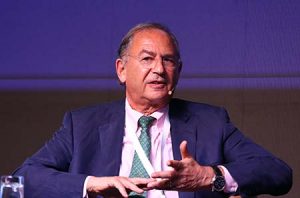
Not mincing words about the potent role of the media, Barnett questioned the open-door policy towards international players: I think regulators face a big question. In the past, they tended to regulate what they could see the newspapers, the TV stations they let foreign media companies come in and didnt regulate them. Whether that is fair or not fair, it will have significant implications for the media in the Middle East.
Regarding FAANG, you might be getting more choice and they may be able to win more advertising, but do the countries in this region want to allow them to dump advertising without regulation? Local media companies will survive, and MBC will continue to thrive, but we will operate in a much smaller market.
To Sarkis query as to why more such agreements are not taking place MENA-wide, Sanjay Raina said MENA is a mental construct. It is 24 different countries with all its issues, regulations and political affiliations. So even if three or four entities come together and form a consortium, that should be good enough. Why should we worry when the biggest broadcaster and a fairly large international player have seen common ground?
The biggest success that Image Nation will ever have is when this industry is self-sustaining We look forward to the day our support for local entertainment is no longer needed Michael Garin, CEO, Image Nation Abu Dhabi
We were thrilled to work with MBC and Sam Barnett, continued Raina. The kind of cooperation and assistance we got in putting together everything demonstrates clearly that in the coming times, you will need to contribute your energies locally towards achieving the larger goal which is taking care of the disruptive consumer. It is no longer about producing a channel and hoping that someone will buy.

Playing devils advocate, Sarkis put to Maaz Sheikh of Starz Play that with broadcasters such as MBC and Fox reinforcing their digital positions, a pure OTT company like Starz Play should worry.
Being a pure OTT player is our biggest strength, countered Sheikh. In terms of technology and premium content we are delivering a world-class experience to our consumers. Consumers have responded and appreciated that it is a fulfilling experience with access to the latest ads-free content.
On the question of whether the growing realisation among broadcasters regarding the importance of their VOD platforms is giving him sleepless nights, Sheikh offered an overview of the MENA audience profile: I believe that this is not a market where only one service can take it all. Netflix is definitely a global powerhouse. Shahid is very strong in Arabic content. But Starz Play is the overall market leader because we are fulfilling the demands for latest Hollywood movies and TV shows for Arab consumers in the region. Our audience survey shows that an estimated 40% of our customers subscribe to at least one of the other OTT services as well. Around 70% of our audience is under 35, so it is a very different demographic. Viewership on OSN set-top boxes and MBC channels is very different to someone tuning in to an Android phone and watching content on it.
Staying independent and not being owned by a telco is extremely important if you want to have the distribution reach in the region Maaz Sheikh, co-founder and CEO, Starz Play
Maaz says he is giving young people what they want and MBC is giving old people what they want, is what Im hearing, observed Sarkis, playing an effective provocateur. Turning to Barnett, he asked whether the traditional broadcasters will become obsolete.
In response, Barnett offered the audience an evidence-backed argument for the continued resilience of linear TV, citing the ratings in the UK for shows such as Love Island and Bodyguard.
In the Middle East, we are still getting 100m-plus audiences on many of our shows, and you do not get that level of penetration on other media. When we dont run a series on TV and run it only on Shahid, we get dramatically less viewers than when we create the awareness on television. So I think the TV case is very clear.
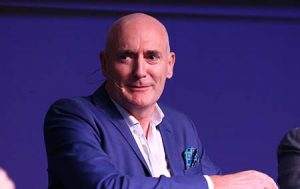
Raina concurred, saying that linear TV both pay TV and FTA is growing. He derided the premature epitaphs written on declining viewership, based on a general downturn in advertising in the region and globally.
Current viewing numbers apart, the demographics should worry linear TV players, Sarkis insisted: As a traditional player, to what extent are you thinking ahead? If you look at the demographics, the declining linear viewership and at how younger viewers consume content, do you need to change your strategy?
We are doing two things, responded Barnett. MBC will win if we produce the best local content. We have just launched our MBC studio, where we intend to massively increase the quality and quantity of drama and film, and that will fuel our TV stations and the expansion and growth of Shahid. If a particular demographic or segment wants to watch on a particular technology or platform, we will provide that, as we have always done.
In the past, [governments] tended to regulate what they could see the newspapers, the TV stations they let foreign media companies come in and didnt regulate them. This will have significant implications for the media in the Middle East Sam Barnett, CEO, MBC Group
Can local content compete against international quality content? I think it can. The challenge for us as a pan-Arab group is to get local enough to reach out to more pan-Arab audiences, and we are looking at various strategies to make that happen.
Admitting that linear TV has seen a significant fall in advertising, things can only get better, Barnett predicted.
You probably couldnt find a worse situation to be in with war and oil prices, so from here on, we can only get stronger. We are seeing in Egypt that advertising has come up the devaluation has hit the floor and based on that, we are hearing that advertising is picking up. Sheikh Waleed has asked that we move aggressively into OTT, and I have large targets. We intend to expand Shahid and Shahid Plus significantly.
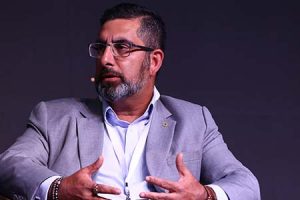
Sarkis then asked Michael Garin of Image Nation how his organisation sees the changing dynamics between traditional and OTT, and whether the organisation is seeing more buyers from outside the region because of OTT.
We are not really a seller of content, clarified Garin. We are here to make everybody on this panel and in the industry successful. We are working with Netflix and Amazon, international companies that were very reluctant to work in this region. Now, through us, they are excited to do local productions that they may not have been prepared to do before.
Citing Qalab Al Adalah (Justice), a courtroom drama produced by Image Nation, he added: We went to the leadership of Abu Dhabi and got them to subsidise this programme. It was not commercially viable but we wanted to demonstrate that this region is capable of producing at a level that it has never seen before. We have done that, and now that the industry is developing we dont have to be involved in similar productions. Our role is not to build Image Nation but to build the nation.
[MENA] is 24 different countries with all its issues, regulations and political affiliations. So even if three or four entities come together that should be good enough Sanjay Raina, SVP and GM, Fox Networks Group
The biggest success that Image Nation will ever have is when the local industry is self-sustaining and viable. We look forward to the day when our support for local entertainment is no longer needed.
If certain organisations are producing content without expecting returns, is that a concern? Sarkis asked Barnett.
That is a problem, Barnett admitted. Pay TV has been caught in this vice between beIN and beout. One side paying vastly too much for content and the other side paying nothing and youre caught in the middle. Thats a very difficult place to be, because non-commercial players crowd out people who are applying commercial rigour and doing all the right things, and thats a great shame. I think the market is big enough to sustain good quality commercial content.
On the real threat of a government-owned company deciding to enter the OTT space and bidding against private companies such as Starz Play, Sheikh said: It might have happened in the past against OSN or MBC. Those with deep pockets will try, but I have seen big shifts in the last five years I dont see that happening anymore. I have seen major telco operators starting to collaborate with players like Starz Play to bring entertainment and broadband bundles to consumers.

We saw our path to the first half a million subscribers through Hollywood. However, to Sams point, in order to grow beyond one million subscribers, we need to strengthen our Arabic content offering to include not only latest TV shows but also include Arabic movies.
On the growing importance of creating local content, Raina offered a global perspective. Content producers have become busier. More content is being produced in China by Fox than ever before. We are producing much more content in India through Star. Unfortunately, the US is being seen as a barometer if OTT/SVOD is working there, it must be working elsewhere as well. But thats not true.
The dominance of linear TV and FTA in places such as India, China, Southeast Asia and Indonesia is incredible. AVOD through Hotstar is doing fantastically well in terms of numbers. It is the right time to stand up and say this is the age of content and content is going to be centre stage. And credit must be given where it is due. We are tapping into this new-age consumer with the help of data, AI, recommendation engines and algorithms.
To the question of investing in content with limited resources in an undervalued market, Barnett offered the audience a whole array of original content, including the ongoing kids show Little Big Shots that MBC has produced.
Sarkis then veered the conversation to 5G, the impact on distribution and the ability to create individual markets as opposed to indiscriminate satellite feeds. He asked: Do you forsee a time when even FTA operators make money from retransmission? Will Saudi Arabia being separated from the UAE help from an advertising perspective?
One of the problems with satellite, Barnett explained, was that we would get paid for one eyeball in Saudi Arabia and we would give another 12 eyeballs for free as people watched in Iraq, Algeria, Mauritania and so on. We have now moved to spot beams for North Africa and Egypt and there will be more to come. Arabsat and Eutelsat are developing more concise spot beams. I remain agnostic on the technology. Whatever works, we will use.
With more effort being put into Shahid and the launch of Fox Plus, Sarkis asked Sheikh if he foresaw greater competition for content and subscribers.
OTT, like any other business, is an execution game, asserted Sheikh. It is not only about content. It is about the overall experience the customer gets. It is about ease of use, video quality and payment options. We see ourselves not only as an entertainment company but also as an e-commerce digital company. We are firm believers that the more Netflix goes into original content, and the more MBC does original Arabic, there will be more room for us to collaborate with major Hollywood Studios to acquire the latest Hollywood TV shows that consumers are demanding.
Lauding his fellow CEO from Starz Play, Raina said: We shouldnt be asking questions of survival but questions of alliances and growth. We see ourselves as a pure content company with Nat Geo and Fox emerging as true content powerhouses. Data shows that people have started watching Nat Geo-style documentaries and lifestyle television on OTT services. We hope to align with all great players, including Starz Play.
Sarkis then introduced the all-important telco question. Are they partners or enemies at this stage? And should an OTT player such as Starz Play be part of a telco?
Staying independent and not being owned by a telco is extremely important if you want to have the distribution reach in the region, stressed Sheikh. Being owned by one telco makes it difficult to work with other telcos. We have partnered and integrated with 21 different telcos in our region. Besides Shahid, no one has achieved that scale of collaboration. Shahid can do that because they are part of MBC. We did it in three years because we have been an independent and standalone OTT player.
Telcos in the region are wanting in terms of preparedness to deploy pay TV, Raina of Fox observed, with the exception of Etisalat, du and STC. When we talk about the MENA region and go into territories where there is little penetration of pay TV, your first alliance would have been with the telco, and most of the telcos are not ready and Im not talking of those we are working with. Also, telcos need to revise their business models to take advantage of 5G.
Garin observed that there are very few instances in the world where telcos have succeeded in their entertainment strategy. Sheikh took the argument one step further to say that telcos are rolling out Android STBs and are able to put Shahid or Starz Play or Netflix on their STBs along with linear channels as part of an IPTV offering. Telcos, he added, are accepting the fact that partnering with established branded services is part of their overall entertainment offering.
On the Saudi question, Sarkis asked if this was an opportunity or threat.
Completely refuting any notion of threat, Garin asserted: We are working with the General Entertainment Authority, with MBC and Nebras Films, among others. My own personal view is that the UAE alone is too small to support a sustainable film and TV industry, with a million Emiratis and a 10 million population. My ideal scenario is to trade the experience and the skillsets of the UAE for the 32m-strong audience base in Saudi Arabia and create a regional solution for a self-sustaining industry.
The Saudis can create it on their own, there is no question, but they are in a hurry. Booking movies from Paramount and Universal and bringing Cirque du Soleil is important, because it shows evidence of their intention and gives people immediate gratification. But what you cannot buy and need time to build is local content, skills and talent. It has taken us eight years to develop those skills.
With more than 400 Saudi nationals working for MBC, Barnett described it as a great Saudi export and said the opening of the media landscape in Saudi Arabia will allow the broadcaster to scout for talent within the country.
When we did Arab Idol, we scouted for talent in 30 different towns and cities across the Arab world and not one in Saudi Arabia, and that has changed.
Sarkis then asked the panel about their outlook for the market in the next five years.
Almost speaking for the panel, Garin said: I am very optimistic. As evident on this panel, everyone, regardless of technology and business model, is committed to increasing the quality of content and this industry is content-driven.
